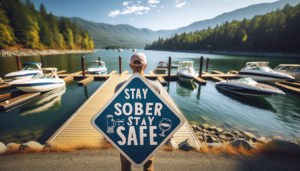- admin
- Uncategorized
- May 24, 2024
Boating is a beloved pastime in California’s Central Valley, with its picturesque Delta waterways and serene local lakes offering endless opportunities for recreation. However, with the enjoyment of these natural beauties comes the responsibility of ensuring safety on the water. A critical aspect of boating safety is understanding the dangers of drinking and driving a boat. This article delves into the importance of staying sober while boating and offers practical tips for ensuring a safe and enjoyable experience on the water.
The Dangers of Drinking and Driving a Boat
Operating a boat under the influence of alcohol is as dangerous as driving a car while intoxicated. Alcohol impairs judgment, coordination, and reaction times, all of which are essential for safe boating. According to the U.S. Coast Guard, alcohol use is a leading contributing factor in fatal boating accidents. The effects of alcohol are intensified on the water due to sun exposure, wind, and boat motion, making boating under the influence (BUI) particularly hazardous.
Legal Consequences
In California, boating under the influence is illegal and carries severe penalties. Law enforcement agencies patrol the waterways and have the authority to stop and inspect boats for compliance. If caught operating a boat with a blood alcohol concentration (BAC) of 0.08% or higher, individuals can face fines, jail time, and the suspension of their boating license. Repeat offenders or those involved in accidents resulting in injury or death face even harsher penalties.
Boating Safety Tips
Designate a Sober Skipper: Before heading out on the water, choose a responsible individual to operate the boat. This designated skipper should commit to staying sober throughout the trip.
Plan Ahead: If your boating excursion includes alcohol consumption, plan ahead to ensure that the boat operator remains alcohol-free. Arrange for alternative transportation or plan to anchor the boat for the night if necessary.
Stay Informed: Familiarize yourself with local boating laws and regulations. Attend a boating safety course to learn about safe navigation, emergency procedures, and the effects of alcohol on boating.
Equip Your Boat: Ensure your boat is equipped with necessary safety gear, including life jackets, fire extinguishers, navigation lights, and a first aid kit. Regularly inspect and maintain your boat to prevent mechanical failures that could lead to accidents.
Stay Alert: Boating requires constant vigilance. Keep an eye out for other vessels, swimmers, and potential hazards. Avoid distractions and focus on safe navigation.
Communicate Your Plan: Let someone on shore know your boating plans, including your departure and expected return times. In case of an emergency, this information can assist rescue operations.
Hydrate and Protect Yourself: Dehydration and sun exposure can exacerbate the effects of alcohol. Drink plenty of water, use sunscreen, and wear appropriate clothing to protect yourself from the elements.
Promoting a Culture of Safety
Promoting boating safety and responsible alcohol consumption is a community effort. Encourage friends and family to adhere to safety guidelines and lead by example. Local boating clubs, marinas, and organizations can play a pivotal role by offering safety workshops and disseminating information about the risks of BUI.
Conclusion
Enjoying the Central Valley’s Delta waterways and local lakes is a privilege that comes with the responsibility of ensuring everyone’s safety. By committing to sober boating and following safety guidelines, we can prevent accidents and enjoy our beautiful waterways safely. Remember, the best way to guarantee a fun and safe boating experience is to always stay sober behind the wheel. Let’s make every boating trip memorable for the right reasons.

